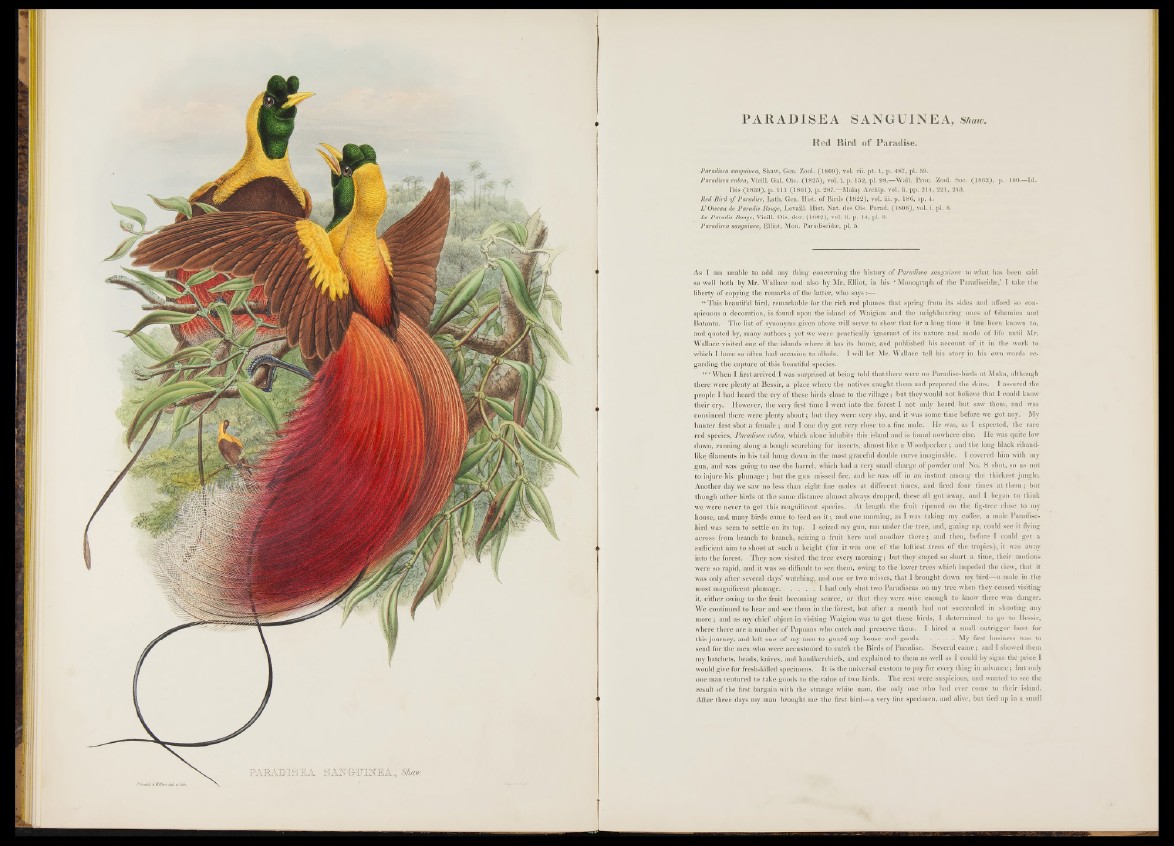
P I® * !
Red Bird of Paradise.
Paradisea sanguinea, Shaw, Gen. Zool. (1 8 0 9 ), voi. vii. pt. 1, p. 487, pi. 59.
Paradisea rubra, Vièill. Gal. Ois. (1 8 2 5 ), voi. i. p. 152, pi. 99.—Wall. Proc. Zool. Soc. (1 8 6 2 ), p. 160.—Id.
Ibis (1 8 5 9 ), p. I l i (1 8 6 1 ), p. 287.—Malay Archip. vol. ii. pp. 214, 221, 243.
Red Bird o f Paradise, Lath. Gen. Hist; o f Birds (1 8 2 2 ), vol. iii. p. 186, sp. 4.
L ’Oiseau de Paradis Rouge, Levaill. Hist. Nat. des Ois. Parad. (18 0 6 ), vol. i. pi. 6.
Le Paradis Rouge, Vieill. Ois. dor. (18 0 2 ), vol. ii. p. 14, pi. 3.
Paradisea sanguinea, Elliot, Mon. Paradiseidse, pi. 5.
As I am unable to add any thing concerning the history of Paradisea sanguinea to what has been said
so well both by Mr. Wallace and also by Mr. Elliot, in his ‘ Monograph o f the Paradiseidas,’ I take the
liberty o f copying the remarks o f the latter, who says:—-
“ This beautiful bird, remarkable for the rich red plumes that spring from its sides and afford so conspicuous
a decoration, is found upon the island o f Waigiou and the neighbouring ones o f Ghemien and
Batanta. The list o f synonyms given above will serve to show that for a long time it has been known to,
and quoted by, many authors; yet we were practically ignorant of its nature and mode of life until Mr.
Wallace visited one of the islands where it has its home, and published his account of it in the work to
which I have so often had occasion to allude. I will let Mr. Wallace tell his story in his own words regarding
the capture o f this beautiful species.
“ ‘ When I first arrived I was surprised at being told that there were no Paradise-birds at Muka, although
there were plenty at Bessir, a place where the natives caught them and prepared the skins. I assured the
people I had heard the cry o f these birds close to the village; but they would not believe that I could know
their cry. However, the very first time I went into the forest I not only heard but saw them, and was
convinced there were plenty about; but they were very shy, aud it was some time before we got any. My
hunter first shot a female ; and I one day got very close to a fine male. He was, as I expected, the rare
red species, Paradisea rubra, which alone inhabits this island and is found nowhere else. He was quite low
down, running along a bough searching for insects, almost like a Woodpecker; and the long black ribandlike
filaments in his tail hung down in the most graceful double curve imaginable. I covered him with my
gun, and was going to use the barrel, which had a very small charge-of powder and No. 8 shot, so as not
to injure his plumage; but the gun missed fire, and he was off in an instant among the thickest jungle.
Another day we saw no less than eight fine males at different times, and fired four times at them; but
though other birds at the same distance almost always dropped, these all got -away, and I began to think
we were never to get this magnificent species. At length the fruit ripened on the fig-tree close to my
house, and many birds came to feed on i t ; and one morning, as I was taking my coffee, a male Paradise-
bird was seen to settle on its top. I seized my gun, ran under the tree, and, gazing up, could see it flying
across from branch' to branch, seizing a fruit here and another there; aud then, before I could get a
sufficient aim to shoot at such a height (for it was one o f the loftiest trees o f the tropics); it was away
into the forest. They now visited the tree every morning; but they stayed so short a time, their motions
were so rapid, and it was so difficult to see them, owing to the lower trees which impeded the view, that it
was only after several days’ watchings and one or two misses, that 1 brought down my bird— a male in the
most magnificent plumage..................... I had only shot two Paradiseas on my tree when they ceased visiting
it, either owing to the fruit becoming scarce, or that they were wise enough to know there was danger.
We continued to hear and see them in the forest, but after a month had not succeeded in shooting any
more; and as my chief object in visiting Waigiou was to get these birds, I determined to go to Bessir,
where there are a number o f Papuans who catch and preserve them. I hired a small outrigger boat for
this journey, and left one o f my men to guard my house and goods.....................My first business was to
send for the men who were accustomed to catch the Birds o f Paradise. Several came; and I showed them
my hatchets, beads, knives, and handkerchiefs, and explained to them as well as I could by signs the price I
would give for fresh-killed specimens. It is the universal custom to pay for every thing in advance; but only
one man ventured to take goods to the value of two birds. The rest were suspicious, and wanted to see the
result of the first bargain with the strange white man, the only one who had ever come to their island.
After three days my man brought me the first bird— a very fine specimen, and alive, but tied up in a small